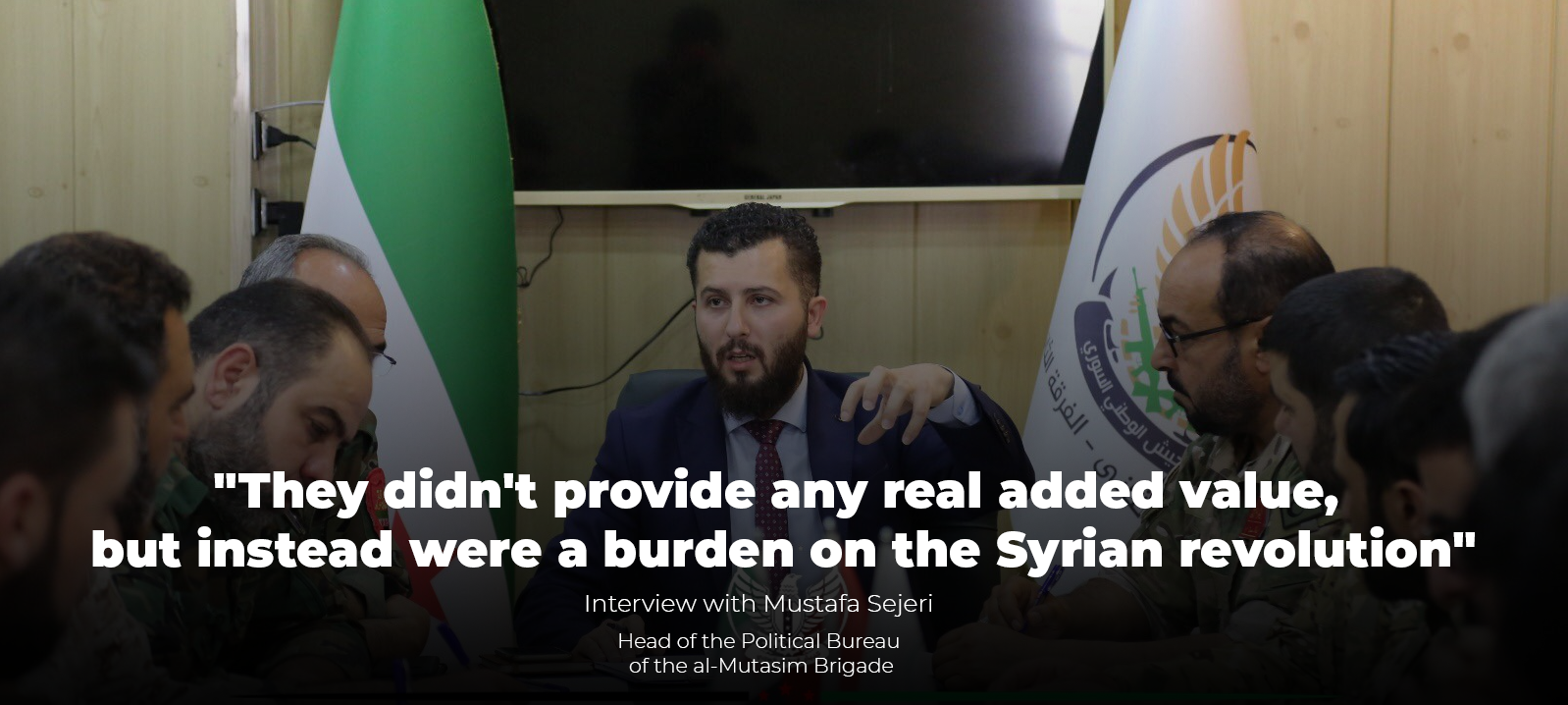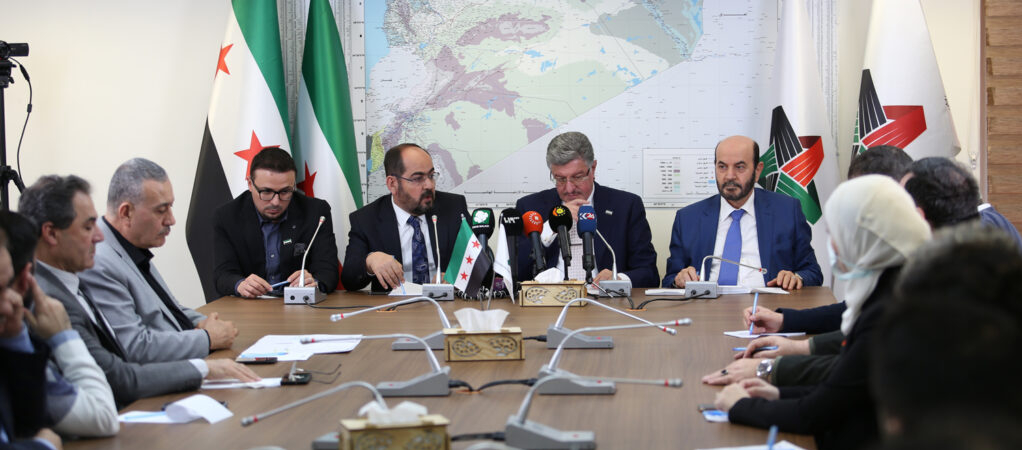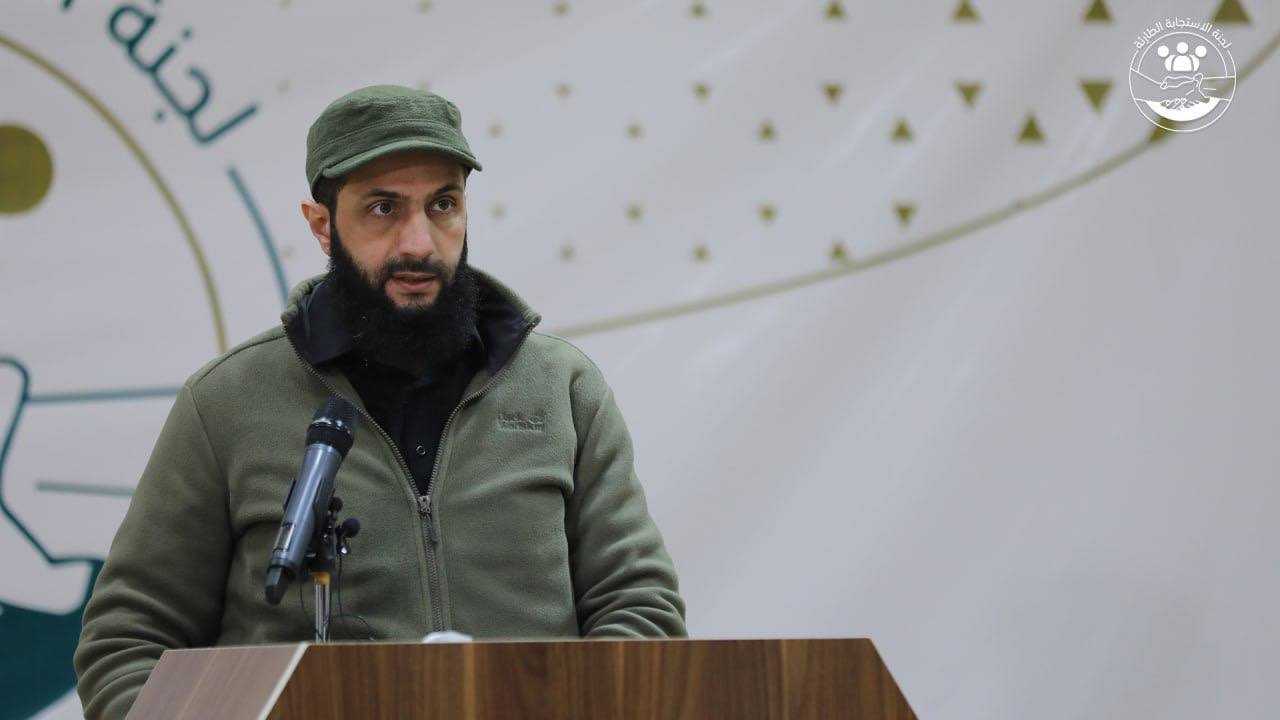
Mustafa Sejari is head of the Political Bureau of the Al-Mutasim Brigade, which is part of the Syrian National Army (SNA). He has played a prominent role in the Syrian revolution since its first days and maintains an active role in the military, political and social affairs of the revolution. In late March he shared a series of tweets regarding the current state of the Syrian revolution, and the need for reform and which was highly critical of the Syrian Interim Government (SIG). Levant 24 had the opportunity to speak with him regarding his tweets and the present and future direction of the Syrian revolution.
L24: We appreciate you taking time from your busy schedule to answer our questions, could you briefly tell us about yourself and your role in the Syrian Revolution over the last 12 years?
Mustafa Sejari: I’m Mustafa Sejari, I was born in Latakia in 1984 and hold a Bachelor’s Degree in Political Science and International Relations. I’m a former political detainee. I was arrested in 2005, in connection with the establishment of the Youth of Change Movement and the launch of the “Defend the Messenger of Allah” campaign in the city of Latakia.
I’m also one of the organizers and leaders of the revolutionary movement in 2011 and was detained four times from the start of the revolution until mid-2012. I was a member of the First Chamber of Arming in the Free Syrian Army, in Istanbul in 2012 and founding leader of the Ezz Bin Abdul Salam Brigades of the Syrian coast area in 2012. I’m also a founder of the Syrian Coast and Idlib Countryside Operations Room, which was founded in 2013 for fighting ISIS and founding councilor of the Syrian Revolution Command Council in 2014. Currently, I’m the head of the Political Bureau of Al-Mutasim Brigade and a leader in the Syrian National Army (SNA).
L24: You recently posted tweets giving six points regarding the state of the revolution and how you feel it needs to be restored, especially in light of the recent normalization movement among many Arab states. Do you believe those tweets were controversial and why do you think there are people with that view?
Mustafa Sejari: I do not think that the recent statements are controversial, but rather a necessary shout to save what is left of the revolution, and an explicit call to protect it.
L24: You mentioned the need for a Revolutionary Command Council (RCC) and said the revolution needs leadership from “within” and needs to close “external” political centers and that “military” groups and factions should be “neutralized,” could you explain what exactly you meant and how you think this should be achieved?
Mustafa Sejari: Over the past 12 years, the external “revolutionary institutions” formed the most important entrance for the external forces to interfere with internal affairs. While they didn’t provide any real added value, but instead were a burden on the Syrian revolution, and therefore a negative factor that weakened the position of the revolution and resulted in many lost opportunities.
Those in charge of the Syrian National Coalition (SNC), the influential people, practiced the most heinous form of blackmailing against the youth of the revolution and its competent cadres, as they monopolized the political decision and prevented any real reform efforts on the pretext of protecting the institution that has political recognition.

L24: You’ve called upon the “sons of the revolution” to take part in the RCC and to establish a central leadership not based on “committees” or “personalities.” If the revolution is to establish a new centralized leadership, how will this practically be done, who will be part of this new leadership and how will it avoid the pitfalls and mistakes of the previous revolutionary bodies and factions?
Mustafa Sejari: The previous problems were linked to a group of corrupt individuals, which was only possible due to the disunity of the reformers and sincere members of the revolution. This resulted in the corrupt individuals controlling the decisions of the revolution’s institutions. Today, the call is addressed to the national reformist forces, far from any attempt to re-empower the corrupters or re-produce them again.
L24: Perhaps the most “inflammatory” of your tweets was your very blunt statement regarding the Syrian Interim Government (SIG), you said it was a “sham government” and a “failure” and pointed out that you see it to have failed on all levels, from administrative to security and military to economic and education. What is the cause of this utter inability to live up to its name? Why do you believe that it was unable to meet its obligations to the Syrian people and further the goals of the revolution?
Mustafa Sejari: The statements about the reality of the government were never inflammatory but explanatory, and the time has come to move beyond fake structures and to impose real bodies capable of fulfilling their duties towards the Syrian people.
L24: In 2021, you were still praising the SIG. Now there is this alleged “about-face,” as some accuse you of, what happened?
Mustafa Sejari: I did not praise the government, but rather put my effort into, and did my best, to build this institution and capacitate the SIG to help it carry out its duties. But we’ve reached a dead end after its failure, and at the same time, we weren’t able to reform its affiliated institutions.
L24: In Idlib, there is a unified authority. How do you view developments in Idlib in light of your criticism of developments in the northern areas? Could you imagine a future cooperation with Idlib’s authorities, the SSG, and HTS?
Mustafa Sejari: The priority now is for rescuing the status quo in the areas under the control of the Syrian National Army (SNA), and then we are open to working with and discussing the mechanisms of protecting our people in Idlib and preventing the Assad and Russian terrorist forces from employing the “classification of HTS” as a pretext to occupy or target the region.
L24: Is there any message or clarification regarding this issue you would like to relay to the Syrian people?
Mustafa Sejari: Our call to save the revolution and all the liberated regions is a sincere call stemming from national, religious, and moral duty. Some conspiracy theorists have been divided while interpreting this call, some said it is directed by the Americans, while others said that it is a prelude to uniting with HTS, and some said it is the post-earthquake awakening, while all of these are illogical and unrealistic perceptions.
Our path of reformation is a long path that started years ago, we were continuously fighting internal battles against corruption and depraving forces, away from the eyes of the media. Yet today we find ourselves forced to declare decisive positions after we’ve reached a dead end.
Yes, we spare no effort to preserve the status quo in Idlib, and the relationship with HTS, as a result of its unacceptable practices towards the forces of the revolution throughout the previous years, as well as the issue of its classification on the “terror lists,” but certainly, we definitely reject any external attempt to attack our people in Idlib.
We look at the Syrian HTS fighters as an important asset for the Sunnis (Ahlu Sunnah Wal Jama’a) in Syria and a spearhead in the face of Iranian terrorist militias in the next stage, and they have to be protected by addressing the issue of their classification on the terror lists.

Before entering Afrin and attacking the third corps, HTS was moving steadily in terms of zeroing the conflicts with the SNA and ending the preexisting differences, and fighting the fundamentalist groups and leaderships with allegiance and loyalty to al-Qaeda. And we hope that HTS continues this path.
Today, we emphasize that HTS needs to reconsider its recent policies related to intervention in the Olive Branch and Euphrates Shield regions and return to what it was prior to the recent aggression. Which was, reaching out for reconciliation and backing down from the previously mentioned and settling the pending issues with the rest of the revolutionary factions.
Our position on HTS was never linked to the (terror) classification, but rather was a natural result of its previous policies, in terms of aggression, tyranny, and accusations of disbelief, and when these issues are addressed and the impact and effects of this black era from the history of HTS are reformed, only then we will reconsider our position towards it, and we will be alongside its sons to protect them from the consequences of the classification on the terror lists.
We do not want HTS to dye our revolution with blackness so the liberated areas become “black,” but we want to help the sincere in it and bring them back to the revolution so that the liberated areas become “green.” This is our vision.1
L24: You once said that you did “not believe that there will be any change in Turkey’s policy toward the revolutionary forces and the Syrian people,” do you still think that is the case today?
Mustafa Sejari: Yes, we still believe that there is no change in Turkish policy towards the revolutionary forces, but duty always imposes us to be cautious and take the necessary precautions to ensure the protection of our people.
L24: For the international community, especially those engaging in, or considering, normalization with the criminal Assad regime, is there anything you would like to convey to them regarding the Syrian revolution or its people?
Mustafa Sejari: When we turned against Assad and started our revolution, we did not ask anyone for permission, we realize that freedom is expensive and we have been and remain ready to pay the price.









